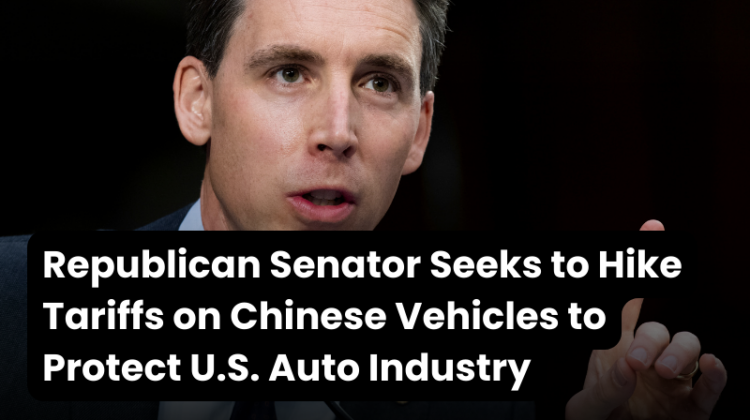
Concerns are mounting that the competitive Chinese auto industry poses an existential threat to U.S. automakers.
In response, Republican Senator Josh Hawley introduced new legislation to protect American auto workers by drastically increasing tariffs on Chinese vehicle imports.
The proposed bill would hike the base tariff rate from 2.5% to 100% on all imported Chinese autos.
This would mean a total tariff of 125% compared to the current 27.5% rate.
________________________________________________________________________
- Republican Senator Josh Hawley introduced legislation to raise tariffs on Chinese vehicle imports to 100%, up from 2.5% currently.
- The goal is to protect U.S. auto workers from Chinese competition as concerns grow about the threat posed by cheap Chinese electric vehicles.
- The proposed 125% total tariff would also apply to Chinese vehicles assembled in Mexico to prevent tariff dodging.
________________________________________________________________________
Republican Senator Seeks to Hike Tariffs on Chinese Vehicles to Protect U.S. Auto Industry
Republican Senator the legislation also seeks to apply the 100% tariff increase to vehicles assembled in Mexico by Chinese automakers to curb tariff dodging.
Hawley stated that the tariff hike was necessary for President Biden to shield U.S. auto workers from Chinese competition.
A bipartisan group of lawmakers recently urged the U.S. Trade Representative to boost levies on Chinese vehicles entering from abroad.
This comes as Chinese EV maker BYD plans to open a factory in Mexico, sparking fears of an influx of cheap Chinese cars.
In a report, the Alliance for American Manufacturing warned that low-cost Chinese vehicles backed by government subsidies could represent an “extinction-level event” for the U.S. auto industry if left unchecked.
However, Chinese automakers have rapidly improved quality and lead in high-tech areas like autonomous driving.
The proposed tariff hike reflects ongoing efforts to curb China’s ambitions to dominate the emerging electric vehicle market through unfair trade practices.
However, the Chinese embassy maintains its auto exports demonstrate the innovation and quality of its manufacturing sector.
With concerns about the competitive threat mounting, the legislation represents the latest push to protect domestic automakers through punitive tariffs.
However, it remains to be seen if the bill will garner sufficient support and if the tariff hike would shield U.S. auto workers while avoiding a harmful trade war.

Leave a Reply